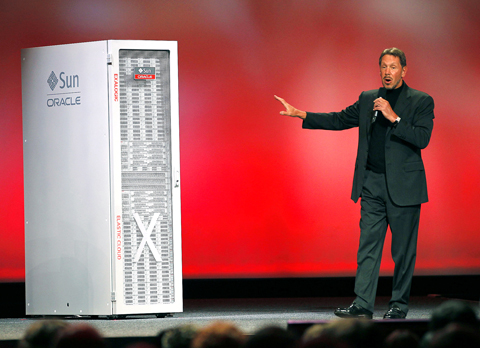Oracle on Sunday reached for the business computing “cloud,” taking an unabashed shot at Salesforce.com’s winning way of selling applications as services on the Internet.
Oracle chief executive Larry Ellison unveiled an Elastic Computing Cloud combination of hardware and software that he said offered 10 times the capacity of IBM’s biggest machine at a quarter of the price.
The US$1.075 million “cloud in a box” stood slightly taller than Ellison and held 30 servers, an Infiniband network and an integrated data storage device.

PHOTO: BLOOMBERG
“This box is capable of 1 million http requests per second,” Ellison said. “If we had two of these machines side-by-side we could do Facebook globally, and they are up to 500 million members.”
Ellison harpooned Salesforce.com as being “way behind the cloud” and argued that true cloud computing for businesses demanded platforms of hardware and software that gave companies flexibility, security and reliability.
Firms have been turning increasingly to “private clouds,” essentially computer systems that let them maximize the power available in machines by sharing and reallocating resources as needed in-house.
“We believe cloud computing is a platform,” Ellison said. “It must be elastic and it must include hardware and software, not just applications on the Net like Salesforce.com.”
Oracle has created a new cloud services divisions run by a former executive at IBM, an Oracle rival.
“The whole idea of cloud computing is to have a pool of resources shared inside a company,” Ellison said. “You get much more efficient use of those resources.”
The cloud computing trend gained momentum during the global economic turmoil, with companies saving money by essentially renting computer applications online as needed instead of buying and maintaining software.
The Elastic Computing box was the first of a series of new offerings Oracle will be unveiling this week at its annual OpenWorld Conference in downtown San Francisco.
Approximately 41,000 people from more than 100 countries are registered to attend what Oracle billed as the world’s largest technology conference.
Oracle set out to reassure that its relationship with computer giant Hewlett-Packard (HP) is intact despite Ellison’s decision in recent weeks to hire ousted HP chief executive Mark Hurd as a co-president.
Before Ellison’s opening keynote, HP executives were given the spotlight to pitch new products that mesh with Oracle offerings.
“This is an area where HP has made a huge investment,” said HP executive vice president of business Ann Livermore, who noted that HP and Oracle have more than 140,000 joint customers. “I think the numbers tell the story.”
Hurd was to address the gathering early yesterday, unveiling a “cool new high-end” business computer machine from Oracle, according to Ellison.
Hurd, 53, resigned as HP chief executive last month after a sexual harassment probe uncovered subterfuge with company expenses.
The investigation found he had not broken harassment rules, but was in breach of HP’s “standards of business conduct.”
Oracle said Hurd has been named to the company’s board of directors as a co-president and will report to Ellison.

The Ministry of the Interior (MOI) is to tighten rules for candidates running for public office, requiring them to declare that they do not hold a Chinese household registration or passport, and that they possess no other foreign citizenship. The requirement was set out in a draft amendment to the Enforcement Rules of the Public Officials Election and Recall Act (公職人員選舉罷免法 ) released by the ministry on Thursday. Under the proposal, candidates would need to make the declaration when submitting their registration forms, which would be published in the official election bulletin. The move follows the removal of several elected officials who were

The Republic of China (ROC) is celebrating its 114th Double Ten National Day today, featuring military parades and a variety of performances and speeches in front of the Presidential Office in Taipei. The Taiwan Taiko Association opened the celebrations with a 100-drummer performance, including young percussionists. As per tradition, an air force Mirage 2000 fighter jet flew over the Presidential Office as a part of the performance. The Honor Guards of the ROC and its marching band also heralded in a military parade. Students from Taichung's Shin Min High School then followed with a colorful performance using floral imagery to represent Taiwan's alternate name

COVETED PRIZE: The US president would be a peace prize laureate should he persuade Xi Jinping to abandon military aggression against Taiwan, William Lai said US President Donald Trump should get the Nobel Peace Prize should he be able to convince Chinese President Xi Jinping (習近平) to abandon the use of force against Taiwan, President William Lai (賴清德) told a conservative US radio show and podcast in an interview. The US is Taiwan’s most important international backer, despite the absence of formal ties, but since Trump took office earlier this year he has not announced any new arms sales to the nation. Trump could meet Xi at the APEC summit in South Korea on Oct. 31 and Nov. 1. Lai, speaking on The Clay Travis and Buck Sexton

A Chinese takeover of Taiwan would severely threaten the national security of the US, Japan, the Philippines and other nations, while global economic losses could reach US$10 trillion, National Security Council Deputy Secretary-General Lin Fei-fan (林飛帆) wrote in an article published yesterday in Foreign Affairs. “The future of Taiwan is not merely a regional concern; it is a test of whether the international order can withstand the pressure of authoritarian expansionism,” Lin wrote in the article titled “Taiwan’s Plan for Peace Through Strength — How Investments in Resilience Can Deter Beijing.” Chinese President Xi Jinping’s (習近平) intent to take Taiwan by force